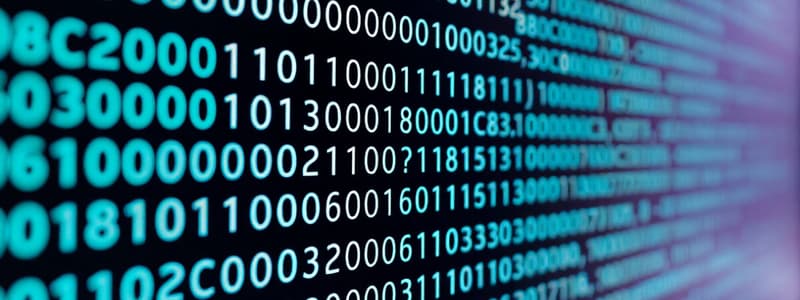Podcast
Questions and Answers
Why are codes that use binary digits necessary for storing decimal data in computers?
Why are codes that use binary digits necessary for storing decimal data in computers?
- Because all computers use binary devices.
- To represent decimal digits. (correct)
- Because octal and hexadecimal cannot represent decimal data.
- To handle alphanumeric characters.
Which of the following number systems can directly store numeric data in a computer?
Which of the following number systems can directly store numeric data in a computer?
- Octal (correct)
- ASCII
- Alphanumeric
- EBCDIC
Why is standard Binary Coded Decimal (BCD) code unsuitable for processing the entire range of alphanumeric characters?
Why is standard Binary Coded Decimal (BCD) code unsuitable for processing the entire range of alphanumeric characters?
- Because it cannot represent the first 6 characters of the alphabet.
- Because it is limited to representing only 16 characters. (correct)
- Because it is a weighted code.
- Because it requires 6 bits per character.
In a Binary Coded Decimal (BCD) system, what decimal value does the binary combination 0110 represent, given the weights 8, 4, 2, and 1?
In a Binary Coded Decimal (BCD) system, what decimal value does the binary combination 0110 represent, given the weights 8, 4, 2, and 1?
Which of the following BEST describes the primary function of codes like BCD, EBCDIC and ASCII?
Which of the following BEST describes the primary function of codes like BCD, EBCDIC and ASCII?
What is the key characteristic of a 'weighted code' like BCD?
What is the key characteristic of a 'weighted code' like BCD?
If a 6-bit BCD code is used, how many different characters can it represent?
If a 6-bit BCD code is used, how many different characters can it represent?
Which of the following codes is specifically designed to handle alphanumeric characters, unlike number systems like binary and octal?
Which of the following codes is specifically designed to handle alphanumeric characters, unlike number systems like binary and octal?
A system requires the ability to represent all 10 decimal digits and a limited set of 6 special symbols. Which encoding scheme would be most appropriate?
A system requires the ability to represent all 10 decimal digits and a limited set of 6 special symbols. Which encoding scheme would be most appropriate?
What is the main difference between BCD and EBCDIC?
What is the main difference between BCD and EBCDIC?
Flashcards
Information Coding
Information Coding
Codes using binary digits to represent decimal numbers for storing data in computers.
Numeric vs. Alphanumeric Data
Numeric vs. Alphanumeric Data
Number systems (octal, binary, hexadecimal) can store numeric data, but not alphanumeric characters.
Binary Coded Decimal (BCD)
Binary Coded Decimal (BCD)
A code where four bits represent a decimal number, with each bit having a weight (8, 4, 2, 1).
BCD '0110' Example
BCD '0110' Example
Signup and view all the flashcards
Limitations of BCD
Limitations of BCD
Signup and view all the flashcards
Study Notes
Information Coding
- Uses binary digits to represent decimal digits.
- It is required to enable data to be stored by the binary (two state) devices that make up all computers.
- Numeric data may be stored in the computer using number systems such as octal, binary, and hexadecimal.
- These number systems do not handle alphanumeric characters.
- Many codes have been created to handle alphanumeric characters, including BCD, EBCDIC, and ASCII.
Binary Coded Decimal (BCD) Code
- Four bits in BCD are used to represent a decimal number.
- There are 16 possible combinations of four bits, making BCD code a weighted code.
- Each BCD combination corresponds to weights 8, 4, 2, and 1.
- In 0110, the first 1 is weighted by 4, the second by 2, which corresponds to decimal 6.
- The BCD code is used to represent 16 characters, which include the ten decimal digits and the first six alphabet characters.
- As such, it is unsuitable for processing alphanumeric characters.
- There is a 6-bit BCD code that can represent 64 (26) characters.
Extended Binary Coded Decimal Interchange Code (EBCDIC)
- EBCDIC is mentioned as one of the codes used to handle alphanumeric characters.
Studying That Suits You
Use AI to generate personalized quizzes and flashcards to suit your learning preferences.




